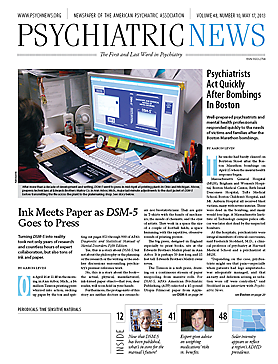Parents of Children With Cancer Show High Psychological Distress
A group of researchers associated with several pediatric oncology treatment facilities has published one of the first studies to describe the experience of distress in parents of children with advanced cancer.
They performed a cohort study embedded within the Pediatric Quality of Life and Evaluation of Symptoms Technology (PediQUEST) study, a randomized, clinical trial. The study was conducted at three children’s hospitals: Boston Children’s Hospital, Children’s Hospital of Philadelphia, and Seattle Children’s Hospital. Parent participants, all of whom had children with advanced (progressive, recurrent, or refractory) cancer, were asked to complete the Survey About Caring for Children With Cancer and were then assessed with the Kessler-6 Psychological Distress Scale. More than 50 percent of parents reported high psychological distress, and 16 percent met criteria for serious psychological distress, compared with U.S. prevalence of 2 percent to 3 percent.
The researchers found that psychological distress was associated with parent perceptions of prognosis, goals of therapy, their child’s symptoms/suffering, and financial hardship. Psychological distress was significantly lower among parents whose prognostic understanding was aligned with concrete goals of care. Results also suggested that younger parents, or parents of younger children, tended to have higher levels of psychological distress. The authors called for future research focused on family interventions aimed at easing distress among parents of children with advanced cancer.
Vascular Risk Scores Better Predictors of Cognitive Decline
Framingham scores measuring vascular risk may predict cognitive decline better than an established dementia profile. Researchers at the Institut National de la Santȳ et de la Recherche Mȳdicale (INSERM, the French National Institute of Health and Medical Research) recently compared the Framingham General Cardiovascular Risk Score and the Framingham Stroke Risk Score with the Cardiovascular Risk Factors, Aging, and Dementia (CAIDE) score that used risk factors in midlife to estimate risk of late-life dementia. Cognitive tests included those to measure reasoning, memory, verbal fluency, vocabulary, and global cognition, assessed three times over 10 years. Study participants were men and women with a mean age of 55.6 years at baseline who took part in the Whitehall II study, a longitudinal British cohort study.
The researchers determined that all three risk scores were associated with a 10-year decline in multiple cognitive tests, although cardiovascular disease and stroke risk showed slightly stronger associations. Higher cardiovascular disease risk and higher stroke risk were associated with greater cognitive decline in all tests except memory, while higher dementia risk was associated with greater decline in reasoning, vocabulary, and global cognitive scores.
“Framingham vascular risk scores (and other vascular risk scores used in primary care) may have a dual advantage over a dementia risk score both in terms of feasibility of use and potential for real benefit from vascular risk factor modification,” said the researchers. “At present, patients are told that their cardiovascular risk predisposes them to heart disease and stroke; in the future, they could also be told that they may be at higher risk of cognitive decline.”
Link Found Between Substance Use, PDs Among MDD Patients
Patients with major depressive disorder (MDD) often have comorbid psychiatric conditions that affect their smoking rates and may make it difficult to tease out how much smoking is due to MDD, as opposed to these other conditions. This finding came from the Vantaa Depression Study, a collaborative depression research project between the Mood, Depression, and Suicidal Behavior Unit of the National Institute for Health and Welfare in Helsinki, Finland, and the Department of Psychiatry of Helsinki University Central Hospital at Peijas Hospital, which provides secondary-care psychiatric services to all of the approximately 169,000 residents of the municipality of Vantaa. After baseline evaluation, participants were evaluated again at six months, 18 months, and five years.
The researchers concluded that smoking among MDD patients is associated with several important clinical characteristics, particularly substance-use disorders, and with personality factors (personality disorders and neuroticism), which may markedly confound research on the impact of smoking. Rather than depression and smoking covarying or predicting each other, smoking and alcohol-use disorders each have strong autoregressive tendencies. These findings are more consistent with common factors causing their association than with depression resulting in increased smoking or smoking inducing onset of depression. ■
Holma I, Holma K, Melartin T, et al. “Depression and Smoking: A 5-year prospective Study of Patients With Major Depressive Disorder.” 2013. Depress Anxiety. April 19 [Epub ahead of print].
http://www.ncbi.nlm.nih.gov/pubmed/23606190.

